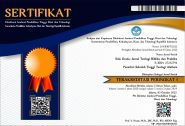Sisi Gelap Allah dalam Kitab Ayub
Abstract
Abstract:
A careful reading of the book of Job will reveal the dark side of God. God acted as if it were against His nature. God is merciful and kind, but he is the cause of Job’s suffering and does not provide answers to Job’s questions about the reason for his suffering. Some experts discuss this, but others ignore it. Through examining the book of Job, the author tries to explain the dark side of God in the book of Job. The author divides the book of Job into several parts, namely Job 1-2, 3-37, 38-41 and 42, as a basis for discussion and seeks to provide a theological review of God’s attitude and character towards Job in dealing with his suffering, interaction with his friends, or even with God himself. God was willing to “bet” with Satan, thus bringing tragedy in the life of Job, a godly man. God was silent totally in the midst of the theological debates of Job and his friends. God who spoke through His wisdom and omnipotence yet did not answer Job’s questions about the reasons for the tragedy in his life. Instead, God restored Job with his partial compensation. This article aims to remind readers of the dark side of God that will remain a mystery. The believer has to embrace this dark side of God with a faith that is not based on knowledge, feelings and experience but a total commitment to God. Total trust in God regardless of everything God allows to happen in his life.
Abstrak:
Pembacaan yang teliti terhadap kitab Ayub akan menghadirikan sisi gelap Allah. Allah bertindak seolah-olah bertentangan dengan natur-Nya. Allah yang maha murah dan baik justru yang menjadi penyebab penderitaan Ayub yang saleh dan tidak memberikan jawaban atas pertanyaan Ayub tentang alasan penderitaannya. Ada ahli yang membahas hal ini, tetapi ada ahli yang mengabaikannya. Melalui penyelusuran kitab Ayub penulis berupaya memaparkan sisi gelap Allah dalam kitab Ayub. Penulis membagi kitab Ayub menjadi beberapa bagian, yaitu Ayub 1-2, 3-37, 38-41 dan 42 sebagai dasar pembahasan dan berupaya memberikan tinjauan teologis sikap dan karakter Allah terhadap Ayub dalam menghadapi penderitaannya, interaksi dengan teman-temannya, atau bahkan dengan Allah sendiri. Allah yang mau “bertaruh” dengan Iblis, sehingga membawa tragedi dalam kehidupan Ayub, seorang yang saleh. Allah yang membisu di tengah perdebatan teologis Ayub dan teman-temannya. Allah yang berbicara melalui hikmat dan kemahakuasaan-Nya, namun tidak memberikan jawaban atas pertanyaan Ayub tentang alasan tragedi dalam hidupnya. Allah yang memulihkan Ayub dengan kompensasi parsialnya. Artikel ini bertujuan untuk mengingatkan pembaca akan sisi gelap Allah yang akan tetap menjadi suatu misteri. Hal ini perlu disikapi oleh orang percaya dengan iman yang tidak didasarkan atas pengetahuan, perasaan dan pengalaman, tetapi pada komitmen total kepada Allah. Kepercayaan total kepada Allah terlepas dari segala hal yang Allah izinkan terjadi dalam kehidupannya.
Full Text:
PDF (Bahasa Indonesia)References
Carney, Josh. “Holding the Faith: Lessons on Suffering and Transformation in the Book of Job.” Review and Expositor 111, no. 3 (2014): 281–286.
Doak, Brian R. “Monster Violence in The Book of Job.” Journal of Religion and Violence 3, no. 2 (2015): 269–288.
Fokkelman, Jan P. The Book of Job in Form. A Literary Translation with Commentary. Leiden: Brill, 2012.
Fox, Michael V. “God's Answer and Job's Response." Biblica 94, no. 1 (2013): 1–23.
———. "The Meanings of the Book of Job." Journal Biblical of Literature 137, no. 1 (2018): 7–18.
Fretheim, Terence E. "God in the Book of Job." Currents in Theology and Mission 26, no. 2 (1999): 85–93.
Guillaume, Philippe, and Michael Schunck. "Job’s Intercession: Antidote to Divine Folly.” Biblica 88, no. 4 (2007): 457–472.
Halbertal, Moshe. “Job, the Mourner.” In The Book of Job. Aesthetic, Ethics, Hermeneutics, edited by Leora Batinsky and Ilona Pardes, 47–46. Berlin: De Gruyter, 2015.
Hartley, John E. The Book of Job. NICOT. Grand Rapids: William B. Eerdmans Publishing Company, 1988.
Labobar, Yuni Feni. “Sufisme Dalam Lagu.” Da’at: Jurnal Teologi Kristen 1, no. 2 (2020): 29–35.
Lopez, Kathryn. “The Book of Job Is a Parody. A Capricious, Insecure God.” Christian Century 5, no. 4 (2022): 12–13.
Mare, Leonard. “The God of Job.” Verbum et Ecclesia 33, no. 1 (2012): 1–6.
Margulies, Zachary. “Oh That One Would Hear Me! The Dialogue of Job, Unanswered.” The Catholic Biblical Quarterly 82, no. 4 (2020): 582–604.
Martin, Troy W. “Concluding the Book of Job and YHWH: Reading Job from the End to the Beginning.” Journal Biblical of Literature 137, no. 2 (2018): 299–318.
Ozick, Cynthia. “The Impious Impatience of Job.” American Scholar 67, no. 4 (1998): 15–24.
Timmer, Daniel. “God ’s Speeches, Job’s Responses, and the Problem of Coherence in the Book of Job: Sapiential Pedagogy Revisited.” Catholic Biblical Quarterly 71, no. 2 (2009): 286–305.
DOI: https://doi.org/10.47596/sg.v3i1.190
Refbacks
- There are currently no refbacks.
SOLA GRATIA diindeks oleh:
Published: Sekolah Tinggi Teologi Aletheia
Address: Aletheia Theological College, Jl. Argopuro No.28-34, Lawang, Kec. Lawang, Kabupaten Malang, Jawa Timur 65211
Website E-Jurnal: http://sttaletheia.ac.id/e-journal/index.php/solagratia/index
e-ISSN 2723-2794, p-ISSN 2723-2786 
Ciptaan disebarluaskan di bawah Lisensi Creative Commons Atribusi-BerbagiSerupa 4.0 Internasional.
Copyright © SOLA GRATIA: Jurnal Teologi Biblika dan Praktika. All Rights Reserved.






.png)